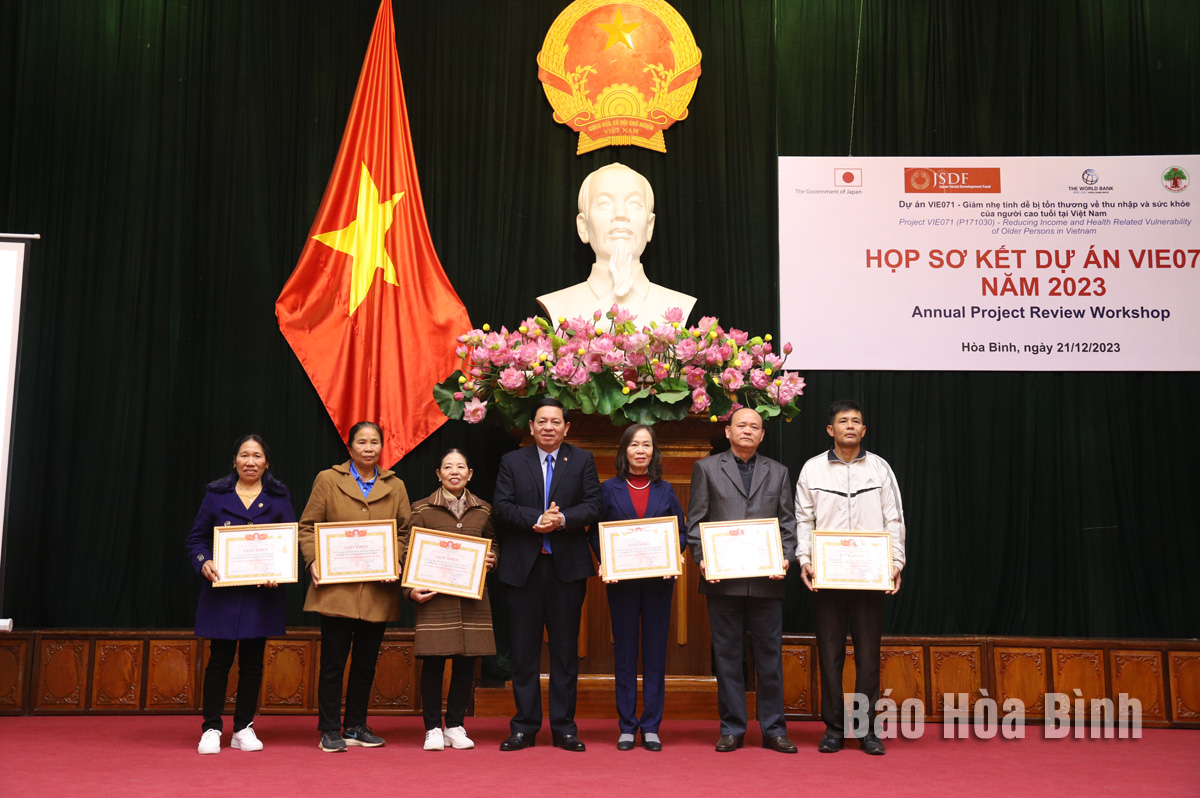
Hoa Binh province’s Association of the Elderly and HelpAge International in Vietnam (HAI) on December 21 organised a conference to summarise the implementation of the project "Reducing Income and Health-Related Vulnerabilities of Older Persons in Vietnam” (VIE071) in the province.

Leaders
of the provincial elderly association award certificates of merit to six
intergenerational self-help clubs.
Project VIE071 is funded by the Japanese Government through the World Bank, and
implemented by the provincial Association of the Elderly and HAI with technical
support from the Vietnam Association of the Elderly.
To date, it has supported the establishment of 30
intergenerational self-help clubs, attracting nearly 1,500 people.
The clubs have been operating effectively this year, helping
provide care to and promote the role of the elderly in the social community.
Under the project, 858 members have been supported to access
loans worth over 4.2 billion VND (172,800 USD).
All the clubs got monthly training and technical support while
366 officers of the elderly association at all levels, the clubs’ leaders,
volunteers and the grassroots medical team were trained and and got their
capacity improved. At the same time, the project has promoted the participation
of relevant departments and branches in developing and expanding the model
across the province.
At the conference, delegates discussed solutions to implement the targets set
for next year. The province aims to have 75 intergenerational self-help clubs
by 2025.
On this occasion, the Vietnam Association of the Elderly awarded a
commemorative medal to an individual of HAI and the provincial association
awarded certificates of merit to six clubs for their excellent performance in
2023.
Hoa Binh province is undergoing a dynamic transformation amid Vietnam’s national digital transition. Building on Poliburo’s Resolution No. 57-NQ/TW on breakthroughs in science, technology, innovation, and national digital transformation, the province has rolled out a wide range of practical action plans. A standout initiative is the "Digital Literacy for All” movement, an effort to ensure that no one is left behind in the digital era.
Hoa Binh province is undergoing a dynamic transformation in the wake of the national digital transformation movement. Building on Resolution No. 57-NQ/TW of the Politburo on breakthroughs in science, technology, innovation, and national digital transformation, the province has implemented a wide range of practical action plans. A standout initiative is the "Digital Literacy for All” movement ambitious effort to ensure that no one is left behind in the digital age.
With a spirit of unity and proactive problem-solving, the Party Committee, the government and the people of Dong Lai Commune (Tan Lac District) have made great strides in implementing the resolutions of the 24th Party Congress of the commune for the 2020 - 2025 term. Focusing on leadership and practical actions, the commune has brought the Party’s resolutions into daily life, creating strong impacts and pushing the local development forward.
Amid the nationwide push for digital transformation, young people in Hoa Binh Province are stepping up as dynamic pioneers, applying technology to enhance Youth Union operations and expand the reach of youth-led initiatives. Through creativity and adaptability, Youth Union organizations at all levels have introduced a series of practical solutions, contributing to modern governance and community development.
In recent years, An Nghia commune, located in Lac Son district, has stepped up administrative reform, focusing on improving the quality and efficiency of its single-window service unit for receiving and processing administrative procedures. These improvements have helped create favourable conditions for local residents and organisations to handle administrative procedures, contributing to the commune’s broader socio-economic development.
The Prime Minister-approved master plan to develop the multi-use value of forests ecosystems through 2030, with a vision to 2050, aims to improve the management and sustainable use of forest resources, create jobs, increase incomes, and improve the living standards of ethnic minorities, people in mountainous and remote areas, forest workers and those living near forests.



